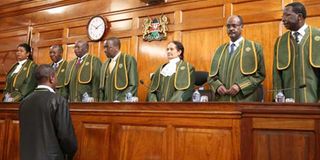EA leaders meet to discuss justice system reforms

Supreme Court Judges on March 13 2014, led by Chief Justice Willy Mutunga (centre). FILE PHOTO | BILLY MUTAI |
What you need to know:
- Kenya’s Chief Justice Willy Mutunga and retired Nigerian president Olusegun Obasanjo will be among the key speakers at the event.
- In Kenya, the constitution offers the legal foundation for the introduction of alternative dispute resolution.
Alternative dispute resolution mechanisms will be on the cards when senior government officials, judges, lawyers and business leaders from East Africa meet in Nairobi this week.
The conference, which will discuss how to transform the justice systems in the region, will be held September 25-26 at the Windsor Golf Hotel and Country Club.
Kenya’s Chief Justice Willy Mutunga and retired Nigerian president Olusegun Obasanjo will be among the key speakers at the event.
Others are Justice Muhammadu Uwais (rtd), former Nigerian CJ and a judge at the East African Court of Justice and chairman of NCMG International in East Africa, James Ogoola.
The theme of the two-day conference is “ADR and Rule of Law for East African Prosperity”.
The conference has been organised by NCMG International and the Kenya Judiciary Training Institute (JTI) in partnership with Kenya Investment Authority (KenInvest), Chartered Institute of Arbitration, Kenya, and the Law Society of Kenya (LSK), among others.
Justice Ogoola said access to justice remains a key indicator of development for any country although it is a major challenge for developing countries, particularly in Africa.
“It is not surprising therefore that many developing countries are giving priority to judicial reforms as a precondition to encourage new investment,” he said.
He said alternative dispute resolution systems can play a big role in reducing the backlog of cases in the litigation dockets of the court.
Justice Ogoola said some of the benefits of alternative systems include access to justice for all, reduction in the case dockets of judges and speedy resolution of disputes.
Others are reduction in the cost of resolving disputes, resolutions suited to parties’ needs, public satisfaction with the justice system and restoration of pre-dispute relationships, among others.
In Kenya, the constitution offers the legal foundation for the introduction of alternative dispute resolution.
It allows for the promotion of reconciliation, mediation and arbitration.





